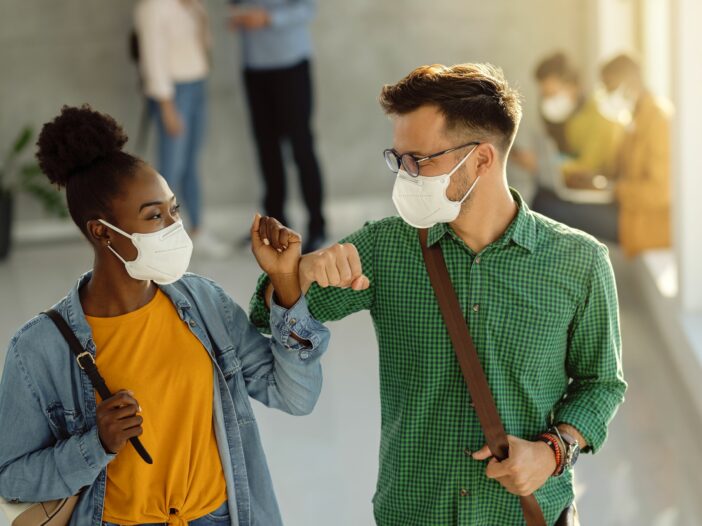
How to Get “Back to Normal” — At Your Own Pace
A year and a half ago, most of us were barely giving “the COVID-19 thing” any thought at all. Then we found ourselves thrust into a culture shock of isolation in March 2020, spending months staying home, wearing masks, logging on to virtual meetings and classes, and trying to stay healthy — physically and mentally — through a tumultuous global crisis.
Today, it seems like the coronavirus pandemic is receding, giving way to resuming more of the activities and routines we were used to before the pandemic. With a vaccine widely available, we turned our calendars to the warmth of long summer days and the hope that soon everything would go back to normal.
But what exactly is normal?
After 16 months of safer-at-home orders, political upheaval, difficult conversations, and rollercoaster changes, it’s not as easy as flipping a switch to the way things used to be. Many of us are worried about not only the pandemic’s continuing health implications — but also how we navigate in-person interactions after months of isolation.
How do we keep ourselves well and form meaningful connections while dealing with this anxiety? While there may not be perfect answers, there are things we can do to begin to re-emerge and re-engage with the wider world. The pandemic isn’t over
While things are much safer than they were at this time last year — and we’re incredibly thankful for that! — it’s important to acknowledge that the coronavirus pandemic isn’t over. There are many valid reasons to be nervous about getting back out and about, including:
- Uncertainty about how long the vaccine will be effective
- Navigating the landmines of differences between those who got vaccinated and those who are choosing not to
- Worrying about loved ones who are immunocompromised
- Feeling pressure to “be fun” or hide your anxiety
- Questioning your confidence interacting with new people (or reengaging with old connections after months apart)
- Wondering how to handle difficult conversations if they come up
- And more
It’s important to remember that everyone handles things differently — and that’s okay. You might feel all, some, or none of the above concerns. Whatever emotions you’re having, they’re valid! It’s okay to acknowledge, name, and process them.
Some ideas to help you ease back in
Set limits on how much time you spend reading the news
Sometimes, an “information detox” can help us feel less stressed. It’s important to stay in the know on important topics — you want to be up to date on local health regulations! — but it’s also okay to limit yourself to just 5-10 minutes of COVID news per day.
Continue scheduling virtual time with friends & loved ones
Many of us enjoyed connecting virtually with friends and family we couldn’t visit in person. If you’ve enjoyed Zoom game nights or family video chats, there’s no reason to give them up completely just because places are opening up!
Consider asking if your loved ones would like to keep a running date on the calendar so you can still connect without always leaving the house.
Come up with some go-to questions and answers for conversation
Our world has been through so much over the past year that typical conversation starters might feel a little flat. It might sound silly, but it can help: There’s nothing wrong with preparing a few go-to topics ahead of time!
Spend some time thinking about the questions you really wish someone would ask you — maybe how you are, maybe what you’re most excited about, maybe even what you’re nervous about — and give your loved ones the space to answer them. This will both help your conversations feel more meaningful and take some of the pressure off of you on the spot.
Remember multiple things can be true at once
“Dialectical thinking” is something that can be really helpful in overwhelming times like this. It refers to the ability to view issues from multiple perspectives — essentially, to know that even seemingly contradictory things can be true at the same time.
You might be experiencing some of these examples of dialectical statements as life “moves on” from the coronavirus pandemic:
- I feel safer than I did, but I still feel scared.
- I’m excited to go more places, but I’m also nervous.
- I love my friends and family, but I’m not sure how to talk to them sometimes.
- I feel supported, but I also feel alone.
- I trust science, but I still have doubts about the vaccine.
- I miss my connections, but I’m not sure if I want to rekindle them.
At the end of the day, it’s possible to honor multiple emotions at once.
Just because you’re excited to stop wearing your mask everywhere doesn’t mean you can’t also be nervous about taking it off. Just because you want to be social doesn’t mean you can’t worry about getting back out there. Just because the pandemic is winding down doesn’t mean it’s over in an instant.
Find your own balance
In many ways, we have more opportunity to connect with those around us than we did a few months ago — but in others, things feel even more complicated.
At the end of the day, it’s okay to make your own decisions.
Take time for yourself. Remember that your feelings are valid. And don’t worry about doing this “right” or just like everyone else — because the truth is that the last year and a half has been uncharted territory for all of us. We are all learning and making choices we can live with. That may not look the same for everyone. Hopefully, you are learning to trust yourself while navigating this new normal we are all facing together.
Candid is here for you
Here at Candid, we celebrate every win and try to practice grace in the face of difficulty. Our individual experiences are different, but we’re still all in this together — and meaningful connections, no matter how they’re created (in person or virtually) can make all the difference.
Don’t hesitate to reach out and let us know how we can best support you!
Written by Haley Young
Content Specialist, The Digital Ring
